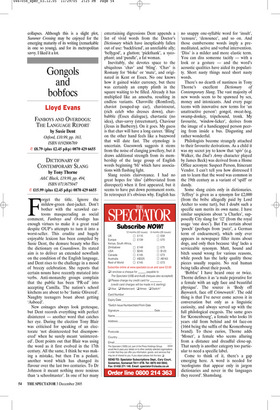Gongols and bobfocs
Lloyd Evans
FANBOYS AND OVERDOGS: THE LANGUAGE REPORT by Susie Dent Oxford, £10.99, pp. 163, ISBN 0192806769 V £8.79 (plus £2.45 p&p) 0870 429 6655 DICTIONARY OF CONTEMPORARY SLANG by Tony Thorne A&C Black, £19.99, pp. 494, ISBN 0713675047 V £15.99 (plus £2.45 p&p) 0870 429 6655 Forget the title. Ignore the mildew-green dust-jacket. Don’t bother with the scrawled cartoons masquerading as social comment, Fanboys and Overdogs has enough virtues to make it a great read despite OUP’s attempts to turn it into a worst-seller. This erudite and hugely enjoyable lexicon has been compiled by Susie Dent, the demure beauty who flies the dictionary on Countdown. Its stated aim is to deliver an extended newsflash on the condition of the English language, and Dent rises to the challenge in a mood of breezy celebration. She reports that certain nouns have recently mutated into verbs. Anti-monarchy groups complain that the public has been ‘PR-ed’ into accepting Camilla. The nation’s school kitchens are about to be ‘Jamie Olivered’. Naughty teenagers boast about getting ‘Asboed’.
New coinages always look grotesque, but Dent records everything with perfect disinterest — another word that catches her eye. During the election Tony Blair was criticised for speaking of an electorate ‘not disinterested but disempowered’ when he surely meant ‘uninterested’. Dent points out that Blair was using the word as it first evolved in the 17th century. All the same, I think he was making a mistake, but then I’m a pedant, another word which has changed its flavour over the last two centuries. To Dr Johnson it meant nothing more noxious than ‘a schoolmaster’. In one of her many entertaining digressions Dent appends a list of vivid words from the Doctor’s Dictionary which have inexplicably fallen out of use: ‘backfriend’, an unreliable ally; ‘bellygod’, a glutton; ‘pickthank’, a sycophant; and ‘pundle’, a fat woman.
Inevitably, she devotes space to the ubiquitous ‘chav’ and ‘bling’. ‘Chav’ is Romany for ‘bloke’ or ‘mate’, and originated in Kent or Essex. No one knows how it gained wider currency, but there was certainly an empty plinth in the square waiting to be filled. Already it has multiplied like an amoeba, resulting in endless variants. Chavsville (Romford), chaviot (souped-up car), chavistocrat, (rich celeb who dresses down), chavbabble (Essex dialogue), chavtastic (no idea), chav-savvy (streetsmart), Chaviour (Jesus in Burberry). On it goes. My guess is that chav will have a long career. ‘Bling’ on the other hand feels like a buzzword that will date fast. The etymology is uncertain. Guesswork suggests it stems from the noise of clanging jewellery, but it draws additional strength from its membership of the large group of English words beginning ‘bli’ which have associations with flashing light.
Slang resists clairvoyance. I had no great hopes for ‘diss’ (abbreviated from disrespect) when it first appeared, but it seems to have put down permanent roots. In retrospect it’s obvious why. English has no snappy one-syllable word for ‘insult’, ‘censure’, ‘denounce’, and so on. And those cumbersome words imply a premeditated, active and verbal intervention. ‘Diss’ is a milder and more elastic term. You can diss someone tacitly — with a look or a gesture — and the word’s acoustic qualities have aided its popularity. Short nasty things need short nasty words.
There’s no dearth of nastiness in Tony Thorne’s excellent Dictionary of Contemporary Slang. The vast majority of new words seem to be spawned by sex, money and intoxicants. And every page teems with innovative new terms for ‘an unattractive person’: gongol, sweat-hog, swamp-donkey, tripehound, tronk. My favourite, ‘window-licker’, derives from the image of a handicapped person peering from inside a bus. Disgusting and rather wonderful.
Philologists become strangely attached to their favourite derivations. As a child it was my secret joy to know that ‘spiv’ (e.g. Walker, the Dad’s Army character played by James Beck) was derived from a Home Office acronym: Suspect Person, Itinerant Vendor. I can’t tell you how distressed I am to learn that the word was common in the 19th century as a variant of ‘spiff’ or dandy.
Some slang exists only in dictionaries. ‘Jeffrey’ is given as a synonym for £2,000 (from the bribe allegedly paid by Lord Archer to some tart), but I doubt such a specific sum merits its own name. I have similar suspicions about ‘a Charles’, supposedly City slang for ‘12’ (from the royal usage ‘one does’). But I’m certain about ‘pooch’ (perhaps from ‘putzi’, a German term of endearment), which only ever appears in newspaper filler items about dogs, and only then because ‘dog’ lacks a serviceable synonym. Mutt, hound and bitch sound wrong for various reasons, while pooch has the larky quality those pieces usually require. No real human being talks about their pooch.
‘Bobfoc’ I have heard once or twice. Thorne defines it as ‘a male pejorative for a female with an ugly face and beautiful physique’. The source is ‘Body off Baywatch, face off Crimewatch’. The odd thing is that I’ve never come across it in conversation but only as a linguistic curiosity, and always served up with the full philological exegesis. The same goes for ‘Kronenbourg’, a female who looks 16 years old from behind and 64 face-on (1664 being the suffix of the Kronenbourg brand). To these curios, Thorne adds ‘Monet’, a female who seems alluring from a distance and dreadful close-up. That surely is another category too particular to need a specific label.
Come to think of it, there’s a gap emerging here. A word is needed for ‘neologisms that appear only in jargon dictionaries and never in the languages they record’. Shamslang.



























































 Previous page
Previous page